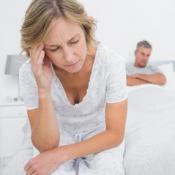 Anxiety can undermine quality of life for women after menopause, according to a study published in the journal Menopause. The study also found women who experience anxiety are more likely to experience physical health ailments, such as hot flashes and pain in muscles and joints.
Anxiety can undermine quality of life for women after menopause, according to a study published in the journal Menopause. The study also found women who experience anxiety are more likely to experience physical health ailments, such as hot flashes and pain in muscles and joints.
How Anxiety Affects Menopausal Women
Researchers followed a cross-sectional sample of 3,503 postmenopausal Latin American women. Women who experienced anxiety were five times more likely than their peers to experience joint pain, muscle pain, severe urogenital symptoms, and hot flashes.
It is unclear why anxiety was correlated with an increase in physical symptoms. Some research suggests anxiety can increase levels of the neurotransmitters serotonin and norepinephrine. This change can increase vasomotor symptoms such as hot flashes.
Does Menopause Cause Anxiety?
Menopause is more than just a chemical change. It can also affect how a woman feels about her body and her life. Because menopause marks the end of fertility, it may be difficult for women who want to have more children.
Some research suggests chemical shifts during menopause contribute to anxiety. According to the Cleveland Clinic, shifts in estrogen and progesterone during menopause may trigger anxiety and depression. While some women develop panic during menopause, frequent panic attacks are not typical of menopause and may require medical treatment.Treating Anxiety in Menopause
Some women may experience relief from anxiety when menopause ends and hormonal fluctuations are less frequent or severe. Even when anxiety is due to hormonal shifts, however, it is treatable. Anti-anxiety medications, psychotherapy, and lifestyle changes—such as improving diet, reducing caffeine intake, quitting smoking, and reducing alcohol use—can help.
The study’s authors highlight the importance of screening menopausal women for anxiety. The data, they say, suggest anxiety may significantly undermine quality of life as women enter menopause.
According to the Anxiety and Depression Association of America, anxiety is the most common mental health diagnosis in the United States. Anxiety affects 40 million adults, who account for about 18% of the population.
References:
- Anxiety linked to severe quality-of-life impairment in postmenopausal women. (2017, January 25). Retrieved from http://www.news-medical.net/news/20170125/Anxiety-linked-to-severe-quality-of-life-impairment-in-postmenopausal-women.aspx
- Can menopause cause your anxiety or panic attacks? (2016, May 4). Retrieved from https://health.clevelandclinic.org/2016/05/can-menopause-cause-your-anxiety-or-panic-attacks/
- Facts & statistics. (n.d.). Retrieved from https://www.adaa.org/about-adaa/press-room/facts-statistics
- Wallace, A. (2017, January 25). Anxiety takes toll on postmenopausal women: Study. Retrieved from http://www.upi.com/Health_News/2017/01/25/Anxiety-takes-toll-on-postmenopausal-women-Study/6071485363021/
© Copyright 2017 GoodTherapy.org. All rights reserved.
The preceding article was solely written by the author named above. Any views and opinions expressed are not necessarily shared by GoodTherapy.org. Questions or concerns about the preceding article can be directed to the author or posted as a comment below.

 Singing the Menopause Blues
Singing the Menopause Blues 12 Skills and Strategies to Add to Your Anxiety Toolbox
12 Skills and Strategies to Add to Your Anxiety Toolbox Risk Factors, Symptoms, and Ways to Manage Anxiety
Risk Factors, Symptoms, and Ways to Manage Anxiety